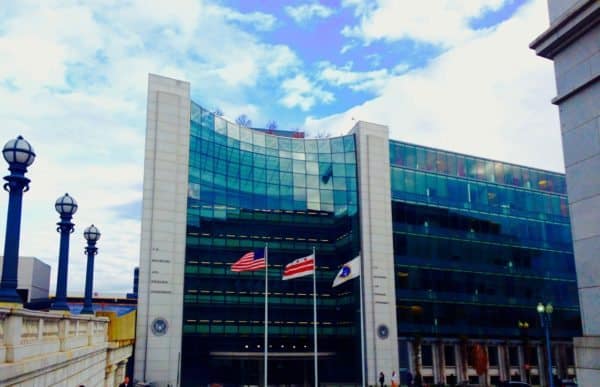November was a busy month for the SEC’s burgeoning regulation of digital assets. In the first action of its kind, the Commission brought enforcement proceedings against the founder of digital asset trading platform EtherDelta for operating as an unregistered securities “exchange.”
Ten days later, the Commission announced a pair of settled actions against token issuers for what the SEC concluded were unregistered securities offerings, imposing a remedy that the agency said offers a “path to compliance” for other historical sales of illegal security tokens.
Topping off its action, key divisions of the SEC released a joint “Statement on Digital Asset Securities Issuance and Trading,” offering commentary about the agency’s spate of recent actions in the space.
Coincidentally or not, November 2018 also saw a dramatic drop in the price of crypto assets—notably including a 37% decrease in the price of Bitcoin and a 40% drop in the price of Ether.
What do these actions by the SEC mean for token issuers, exchanges, and investors? And what should we expect from the SEC now?
EtherDelta – Pumping the Brakes on Non-Compliant Trading Platforms
 On November 8, 2018, the SEC issued a cease and desist order for operating an unregistered securities exchange against Zachary Coburn, the founder of EtherDelta, an online trading platform for ERC20 compatible tokens. The EtherDelta order marked the SEC’s first enforcement action against a crypto-exchange and only the agency’s second action against a market intermediary.
On November 8, 2018, the SEC issued a cease and desist order for operating an unregistered securities exchange against Zachary Coburn, the founder of EtherDelta, an online trading platform for ERC20 compatible tokens. The EtherDelta order marked the SEC’s first enforcement action against a crypto-exchange and only the agency’s second action against a market intermediary.
EtherDelta was in many ways a typical online trading platform: It permitted trading in approximately 500 digital tokens, publicized available token pairs, listed the top 500 firm bids and offers, and displayed market depth charts and a list of confirmed trades.
The SEC contended that because the ERC20 tokens traded on the platform “included securities as defined by Section 3(a)(10) of the Exchange Act,” EtherDelta was an “exchange” under Section 3(a)(1) of the Exchange Act.
As a result, Coburn, EtherDelta’s 31-year-old operator, either had to register the platform as a national securities exchange or operate it under an exemption from registration.
But which of the 500 tokens on EtherDelta were “securities”?
The SEC won’t tell.
While the Coburn order says vaguely that the tokens on EtherDelta traded “included securities,” the SEC didn’t identify the particular tokens it considered securities, nor did it analyze the supposed security-characteristics of any of the tokens at issue.
This calculated ambiguity is likely intended as a warning by the SEC to digital asset trading platforms to conduct serious pre-listing legal due diligence on individual tokens. The SEC specifically noted in the order that Coburn “performed his own due diligence on these tokens,” including requesting the token’s name, any associated web URL, and a paragraph describing the token, among other things. But the SEC appears to have considered this non-legal due diligence inadequate.
In addition, the SEC specifically noted that about 92% of the 3.6 million transactions on EtherDelta during the relevant period occurred after the SEC issued its July 2017 Section 21(a) DAO Report, warning that digital asset trading platforms that include securities may be operating as an “exchange” subject to registration.
Nevertheless, as a number of commentators have noted, the SEC’s sanctions against Coburn were relatively light.
Coburn agreed to pay $300,000 in disgorgement (plus interest) and a $75,000 penalty. The order noted Coburn’s cooperation, which the SEC expressly recognized in not imposing a greater penalty. Coburn also was not suspended nor barred from the securities industry, which is a common feature in SEC settlements.
Paragon Coin and AirFox – A Roadmap for Fixing Illegal ICOs?
On November 16, 2018, the SEC announced settled enforcement actions in which it concluded that ICOs conducted by Paragon Coin, Inc. and AirFox were illegal unregistered securities offerings. While the SEC had previously taken actions against a number of illegal ICOs, this settlement marked the first time that the SEC did so in the absence of alleged fraud by the issuer or promoter of the tokens.
Interestingly, whether these ICOs were securities offerings wasn’t terribly controversial. Both companies used the token sales to raise money for a fledgling business idea. Both promoted the token sale by encouraging investors to expect profits if management was successful. And both sought to create a market for secondary trading in their tokens by listing them on cryptocurrency exchanges. As in the Coburn order, the SEC noted that the Paragon Coin and AirFox ICOs took place after it had put the market on notice in the DAO Report that some ICOs may violate the federal securities laws.
The settlement requires both companies to (1) distribute a “claim form” to all token purchasers in the ICO, offering either to return the purchase price plus interest, in exchange for a return of the tokens, or to pay damages to those who no longer hold the tokens; (2) register the token as a security with the SEC; (3) become an SEC-reporting company for at least one year; and (4) pay a $250,000 fine.
SEC Statement & Future Implications
On the same day as the Paragon Coin and AirFox announcements, the SEC released a “Statement on Digital Asset Securities Issuance and Trading,” offering observations by key SEC Divisions on recent SEC action in the crypto space. Among the key takeaways are (1) that the SEC will use a “functional approach” in assessing whether and how the securities laws apply to entities operating in the digital asset space, regardless of the terminology used to describe new technologies, and (2) that the terms of the Paragon Coin and AirFox settlements offer a “path to compliance” for other potential illegal (but non-fraudulent) ICOs.
So what does this all mean for the digital asset markets?
While more action is sure to come as the SEC resolves its backlog of investigations in the space, several things seem clear. First, the SEC has put market participants sufficiently on notice of securities law requirements that apply to digital assets, and it is now focusing on non-fraud violations.
Future non-fraud settlements or litigated enforcement actions against alleged non-compliant exchanges, broker-dealers, advisors, and issuers should be expected.
Second, while the SEC tailors penalties imposed to the facts of each case, sanctions imposed against non-compliant (but non-fraudulent) actors will rise overall as time goes on.
Third, ICO issuers have a difficult choice to make: either unwind the transaction and return money to your investors; incur the significant costs imposed on registered issuers under Section 12(g), such as filing period audited public financial reports; or risk serious enforcement action by the SEC.
Many issuers may no longer have the funds to return to investors, and, by taking the SEC’s “path to compliance,” individuals who control issuers may expose themselves to personal liability if the issuer is unable to make investors whole.
Lastly, to the extent investors are inclined to hold their security-tokens, they likely will be left after the Coburn order without a compliant trading venue in the United States. That reduced liquidity will likely weigh on the value of security tokens, making them (paradoxically) less valuable than they would have been as a non-security.
Scott Schirick is a partner at New York-based Pryor Cashman LLP, and the co-head of the firm’s Securities Litigation + Enforcement practice. Scott counsels blockchain projects and market participants on all aspects of U.S. regulatory strategy, and defends companies and individuals in SEC enforcement investigations and proceedings.




